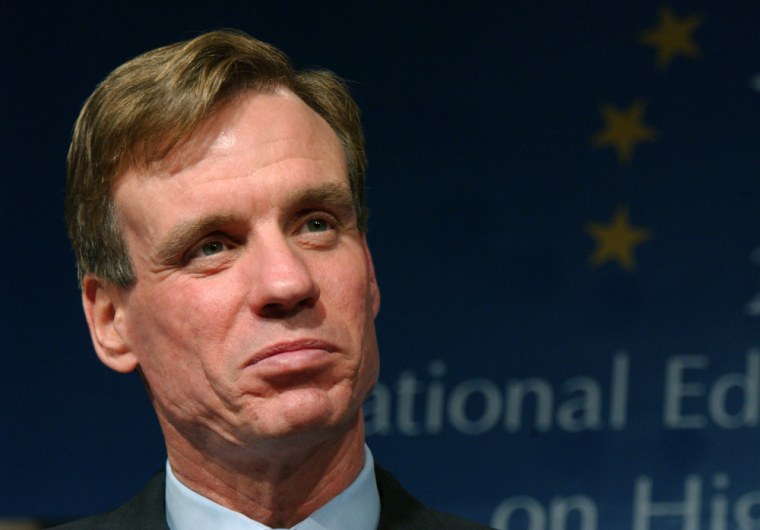Democrat Mark R. Warner, the former governor of Virginia, has decided not to run for president in 2008, fearing the impact of a drawn-out campaign on his family. "I want to have a real life," he said Thursday.
In a written statement, he said he made the decision after celebrating his father's 81st birthday and taking his oldest daughter, Madison, on a college tour.
"I know these moments are never going to come again," Warner said. "This weekend made clear what I'd been thinking about for many weeks - that while politically this appears to be the right time for me to take the plunge, at this point I want to have a real life.
"And while the chance may never come again, I shouldn't move forward unless I'm willing to put everything else in my life on the back burner," he said.
Exploratory efforts
Since Warner left the governor's office in January, he has busily toured key states in the Democratic nomination process, including New Hampshire and Iowa. His political action committee, Alexandria-based Forward Together, has raised money for Warner's exploratory effort and for other Democratic candidates in this year's midterm elections.
"This is not a choice that was made based on whether I would win or lose," Warner said in his statement. "I can say with complete conviction that 15 months out from the first nomination contests, I feel we would have had as good a shot to be successful as any potential candidate in the field."
Warner leaves a crowded field of possible Democratic candidates.
Sen. Hillary Rodham Clinton of New York is widely considered the front-runner for the nomination. Others considering or positioning themselves for a run include Sen. John Kerry of Massachusetts, the 2004 Democratic nominee; former Sen. John Edwards of North Carolina, the vice presidential nominee two years ago; Sens. Evan Bayh of Indiana, Joe Biden of Delaware, Christopher Dodd of Connecticut, Russ Feingold of Wisconsin, Iowa Gov. Tom Vilsack and New Mexico Gov. Bill Richardson.
Time to 'have a life'
Meeting with reporters at a downtown Richmond hotel, Warner said he arrived at his decision over several weeks. He said neither his wife, Lisa Collis, or his daughters, ages 12, 15 and 16, discouraged him from running.
"This is the right time for me in my life to have a life for a little while," Warner said.
Warner said he would not rule out running for the U.S. Senate or his old office again. Republican Sen. John Warner's seat is up for election in 2008 and the next governor's race is in 2009.
But he would not commit to seeking either job.
While he did not rule out a future presidential bid, he conceded: "Things will probably never be as aligned as they are right now."
Alternative candidate
Warner, a centrist who had won in a Republican-leaning state, was seen as a viable Democratic alternative to Clinton. Just last week, Warner traveled to Florida, a critical battleground state, to raise money and help other Democrats. He talked about how his ability to work with Republicans could appeal to Democratic primary voters.
"We have to really get it right and getting it right will require big enough change that it can't be a Democrat-only answer or a Republican-only answer." Warner said. "I think people ... even though they are hardcore Democratic activists, get that."
During his tenure as governor, Warner's approval rating was in the mid-70s in a state that hasn't supported a Democratic presidential nominee since 1964. His lieutenant governor, Timothy M. Kaine, rode that popularity last year to replace Warner, who left because of the state's one-term limit.
His approach won over some Florida Democrats last week.
Rep. Allen Boyd, D-Fla., told a crowd at a Tallahassee fundraiser, "I am being unequivocal about this: I am supporting Mark Warner for president."
In Tampa, Democratic Party fundraiser and former state party executive director Ana Cruz said, "He's got a middle-of-the-road, common sense election message for Americans, which is what they want. We'll see after this election cycle that it's not about partisan politics, it's about who can govern the best."
Warner aide Jim Margolis said the 51-year-old Democrat understood that this was probably his best chance to run for president.
Future possibilities
"He's not ruling out running for political office in the future. He will most certainly be involved in politics and the political debate," the aide said.
Warner could be considered for a vice presidential spot. Another possibility would be Sen. John Warner's seat in 2008. The five-term senator - no relation - is 79.
Mark Warner was elected governor in 2001, defeating Republican Attorney General Mark Earley. The former state Democratic Party chairman, who made a fortune in the infancy of the cellular telephone industry, had never held elected public office.
After a difficult start with a Republican-controlled General Assembly, Warner in 2004 brokered a compromise between Democrats, moderate senators and 17 House Republicans to pass a budget-balancing $1.4 billion tax increase. The tax increase was widely regarded as the signature initiative of his four-tear term.
Warner then returned to private business.
Democrats in a bind?
"A tragedy for the Democratic party" is how one analyst sums up Mark Warner's decision against running for president in 2008.
Larry Sabato,of the University of Virginia's Center for Politics, believes Warner was "one of the strongest, if not the strongest" candidates the Democrats had. He thinks Virginia's former governor could have been the main challenger to Senator Hillary Rodham Clinton, who is considered by many pundits to be the front-runner.
Warner's decision has the Democrats in a bind, the way Sabato sees it. He says that while a lot of candidates are running, few are electable come November 2008. And Sabato warns if the Democrats don't find a centrist candidate, they may watch a third straight presidential election go to the Republicans.
